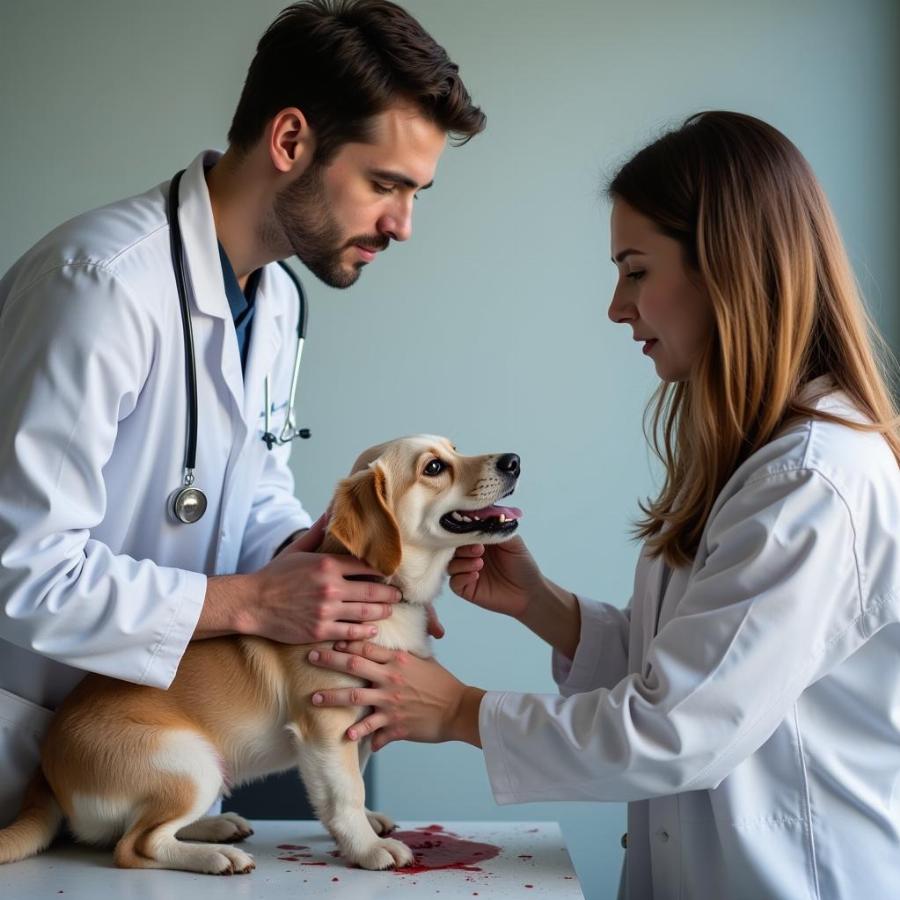Seeing your beloved furry friend vomit is alarming enough, but discovering blood in their vomit can be downright terrifying. This is a situation that demands immediate attention, as it could signify a serious underlying health issue. While this article provides essential information, it’s crucial to remember that it is NOT a substitute for professional veterinary advice. If your dog is vomiting blood, contact your vet immediately or rush them to the nearest emergency animal hospital.
Understanding the Severity of Blood in Dog Vomit
The color of the blood in your dog’s vomit can provide clues about the location and potential severity of the problem:
- Bright Red Blood: This usually indicates fresh bleeding, possibly in the upper digestive tract, such as the mouth, esophagus, or stomach.
- Dark Red or Brownish Blood: This often signals digested blood, suggesting a problem further down in the digestive system or a bleeding issue that occurred earlier.
Potential Causes of Bloody Vomit in Dogs
There are numerous reasons why your dog might be vomiting blood, ranging from mild to life-threatening conditions. Here are some of the most common culprits:
1. Dietary Indiscretion
Dogs are notorious scavengers, and sometimes, their curiosity leads them to ingest things they shouldn’t. Eating spoiled food, garbage, foreign objects, or toxic substances can irritate their stomach lining, leading to vomiting, often with blood.
2. Gastroenteritis
Inflammation of the stomach and intestines, commonly known as gastroenteritis, can be triggered by:
- Infections: Bacterial or viral infections can wreak havoc on the digestive system.
- Parasites: Roundworms, hookworms, and other intestinal parasites can cause irritation and bleeding.
- Food Allergies or Intolerances: Just like humans, dogs can have adverse reactions to certain foods, leading to digestive upset.
3. Ulcers
Open sores in the stomach lining, called ulcers, are often caused by:
- Medications: Certain medications, like non-steroidal anti-inflammatory drugs (NSAIDs), can increase the risk of ulcers.
- Stress: Prolonged stress can contribute to ulcer development.
- Disease: Conditions like kidney and liver disease can also lead to ulcers.
4. Hemorrhagic Gastroenteritis (HGE)
This serious condition causes sudden and severe bloody diarrhea and vomiting in dogs. The exact cause of HGE is unknown, but it’s thought to be linked to bacterial infections or an overactive immune response.
5. Other Serious Conditions
While less common, vomiting blood can also be a symptom of more severe health problems such as:
- Cancer: Tumors in the digestive tract can bleed.
- Liver Disease: The liver plays a crucial role in blood clotting, and liver disease can disrupt this process.
- Kidney Failure: Kidney failure can lead to a buildup of toxins in the blood, irritating the stomach lining.
- Pancreatitis: Inflammation of the pancreas can sometimes lead to vomiting blood.
 Veterinarian Examining a Dog Vomiting Blood
Veterinarian Examining a Dog Vomiting Blood
What to Do If Your Dog Vomits Blood
- Stay Calm: Although it’s a scary situation, try to remain calm. Your dog will pick up on your energy.
- Assess the Situation: Note the color and amount of blood in the vomit, and try to remember any potential triggers, like recent meals or access to garbage.
- Call Your Vet Immediately: Describe your dog’s symptoms in detail and follow their instructions carefully.
- Be Prepared to Transport Your Dog: Your vet will likely want to examine your dog as soon as possible. Have a carrier ready and a blanket to keep them warm and comfortable.
Preventing Future Episodes
While not all causes of bloody vomit are preventable, here are some measures to minimize the risks:
- Secure Hazardous Items: Keep medications, cleaning supplies, and other toxic substances safely out of your dog’s reach.
- Supervise Your Dog Outdoors: Prevent your dog from scavenging and eating things they shouldn’t on walks or in the yard.
- Feed a Balanced Diet: Provide high-quality dog food and avoid feeding table scraps, especially fatty or spicy foods.
- Schedule Regular Vet Checkups: Early detection and treatment of underlying health conditions can prevent many serious complications.
Beaut Dogs: Your Trusted Partner in Dog Care
Beaut Dogs is your one-stop resource for all things dog-related, offering reliable, helpful, and in-depth information about the canine world. When you need support, please contact us at Email: [email protected] to get detailed and accurate answers from Beaut Dogs.